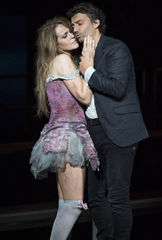| Opera Reviews | 28 April 2024 |
She's bad news, but he can't stay away from herby Steve Cohen |
|
| Puccini: Manon Lescaut The Royal Opera July 2014 (HD screening) |
|
|
Yet it did grip my attention and, contrary to my expectations, its concept is not entirely off base. Instead of the 18th century with wigs and frock coats, director Jonathan Kent sets the story in a contemporary hedonistic world. His Manon is a slut who dresses brazenly from her first scene when she’s on her way to a convent. She is pimped by her sleazy brother and in Act II moves in with a godfather-like Geronte who hires a film crew to record Manon in a woman-on-woman sex scene. The libretto calls for four female madrigalists who come to innocently entertain; here they are four porn actresses hired by Geronte to amuse himself and a group of his leering bald-headed friends. Manon does not seem disturbed or disgusted by this. In fact, she gyrates her body for them, and any sympathy we may have for her evaporates. Even when seeing the Massenet opera, I lose sympathy for the selfish Manon by the time we reach the third scene. In Puccini’s version, and especially in this production, our disenchantment comes much sooner. And that, I believe, is Kent’s point. Des Grieux’s devotion is all the more impressive because the object of his love is so undeserving. In Act III, according to the original novel and the librettos for operas by Massenet and Puccini, Manon is deported for the crime of stealing from Geronte, on a ship along with common criminals. In this production, all the deportees are prostitutes. While all this is exceedingly gross, it does highlight the emotional point that no matter how wayward Manon — or any woman — may be, a man gives her unconditional love and he remains committed till death. That’s heart-wrenching. The story is accompanied by the heart-on-sleeve music of Puccini, creating the first big hit of his career. I can tolerate the transformation because Puccini himself (working with four sets of librettists) radically altered the original story by the Abbé Prévost. He reduced Manon’s innocent start and eliminated everything about Des Grieux’s noble family, including a key scene in which Des Grieux père appeared. Puccini also omitted an important scene of young love in a Paris garret, in which we would have seen indication of regret on the part of Manon. Keep in mind that Manon was supposed to be a virginal and impressionable teenager. Puccini tended towards eliminating her naive side; now Kent goes all the way. Puccini concentrated on the passion of the love between Manon and Des Grieux, and this performance transmits that ardor overwhelmingly. Tenor Jonas Kaufmann, soprano Kristine Opolais and conductor Antonio Pappano deserve kudos for that. In his dashing looks and ringing voice, Kaufmann is an ideal Des Grieux. The voice has baritonal color, yet he has ringing high notes with plenty of squillo. (He reminds me a bit of the great Mario Del Monaco.) Opolais looks more convincing as this incarnation of Manon than anyone else I can picture. With bare thighs, and breasts spilling out of her loose bra, she oozes sexual brazenness. And she sings with sensitivity. Still, if you listen to her audio alone (as I have done in this and other roles) you hear an attractive but unexceptional voice. Her sound lacks the fragility of an Albanese and the lushness of a Tebaldi. Maurizio Muraro is a powerful presence as Geronte. His bass voice is solid and with his stout body and expressive face he exudes hubris and entitlement. Christopher Maltman is perfect as the avaricious brother who leads his kid sister down a destructive path. On stage and especially on a big screen, everyone in the cast looks authentic. Yet in one instance HD is a two-edged sword. Opolais’s bio says she’s 34 years old and she is stunning, but close up her face looks older and is at odds with the character’s extreme youth. Kaufmann is 45 but he looks so much younger that, with him, there’s no cognitive dissonance. The finale, supposedly on a desolate road in Louisiana, here shows Manon and Des Grieux on what appears to be a fly-over highway that ends abruptly — like a drawbridge in raised position. Others have expressed disdain, but I see it as an appropriate metaphor for the abrupt end of a young life.
|
|
| Text ©
Steve Cohen Photo © Bill Cooper |

 This production was denounced in the British press (and by many in the audience) as tawdry and coarse.
This production was denounced in the British press (and by many in the audience) as tawdry and coarse. 





